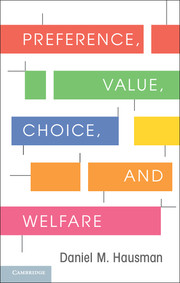Book contents
- Frontmatter
- Contents
- Figures
- Preface
- 1 Preferences, Comparative Evaluations, and Reasons
- Part I Preferences in Positive Economics
- 2 Preference Axioms and Their Implications
- 3 Revealed-Preference Theory
- 4 Preferences, Decision Theory, and Consequentialism
- 5 Game Theory and Consequentialism
- 6 Constraints and Counterpreferential Choice
- Part II Preferences, Welfare, and Normative Economics
- Part III Psychology, Rational Evaluation, and Preference Formation
- References
- Index
3 - Revealed-Preference Theory
from Part I - Preferences in Positive Economics
Published online by Cambridge University Press: 05 June 2012
- Frontmatter
- Contents
- Figures
- Preface
- 1 Preferences, Comparative Evaluations, and Reasons
- Part I Preferences in Positive Economics
- 2 Preference Axioms and Their Implications
- 3 Revealed-Preference Theory
- 4 Preferences, Decision Theory, and Consequentialism
- 5 Game Theory and Consequentialism
- 6 Constraints and Counterpreferential Choice
- Part II Preferences, Welfare, and Normative Economics
- Part III Psychology, Rational Evaluation, and Preference Formation
- References
- Index
Summary
As we saw in Chapter 2, Amartya Sen offers two main interpretations of preference rankings: as rankings of alternatives in terms of expected self-interested benefits and as rankings that represent choices. Chapter 2 argued that preferences cannot sensibly be defined in terms of expected benefit. That leaves the subject of this chapter, the view that preferences constitute the ranking of alternatives that is implicit in people’s choices. As Gul and Pesendorfer (2008, p. 7) put it, “In the standard approach, the terms “utility maximization” and “choice” are synonymous.” Under the label of “revealed-preference theory” many economists have espoused this view of preferences.
In criticizing revealed-preference theory, I shall argue that Gul and Pesendorfer mischaracterize the practice of economics, not that they correctly characterize a mistaken practice. Economists do not and cannot employ a notion of preference defined in terms of choices. The problem lies not in what economists do, but with what some economists, including distinguished economists such as Gul and Pesendorfer, think they are doing. The conception of preferences that economists in fact employ takes them to be subjective states that determine choices only in conjunction with beliefs. Economists cannot substitute a notion of preference defined in terms of choices for this subjective conception. This chapter aims to clear away the confusions caused by defenders of revealed-preference theory and to help economists conceive of their practice more clearly.
- Type
- Chapter
- Information
- Preference, Value, Choice, and Welfare , pp. 23 - 33Publisher: Cambridge University PressPrint publication year: 2011



